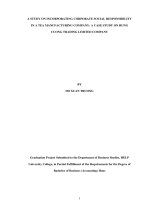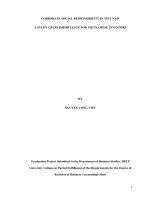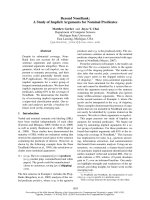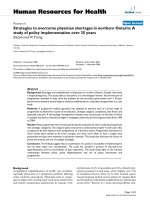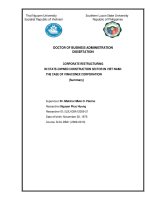corporate social responsibility in viet nam a study of its importance for vietnamese investors
Bạn đang xem bản rút gọn của tài liệu. Xem và tải ngay bản đầy đủ của tài liệu tại đây (358.97 KB, 64 trang )
1
CORPORATE SOCIAL RESPONSIBILITY IN VIET NAM
A STUDY OF ITS IMPORTANCE FOR VIETNAMESE INVESTORS
BY
NGUYEN CONG VIET
Graduation Project Submitted to the Department of Business Studies, HELP
University College, in Partial Fulfillment of the Requirements for the Degree of
Bachelor of Business (Accounting) Hons
2
June 2010
Declaration of Originality and Word Count
DECLARATION
I declare that this graduation project is based on my original work except for
quotations and citation which have been duly acknowledged. I also declare that it has
not been previously or concurrently submitted for any other courses/degrees at HELP
University College or other institutions.
Word Count: 10,125 words.
Nguyen Cong Viet
Date
3
Abstract
CORPORATE SOCIAL RESPONSIBILITY IN VIET NAM: A STUDY OF
ITS IMPORTANCE FOR VIETNAMESE INVESTORS
BY
NGUYEN CONG VIET
June 2010
Supervisor: Dr. Le Van Lien
Corporate Social Responsibility is no longer a new term for developing countries. It
has developed through the long history and nowadays it is expected to implement by
any business entities in the world. However, the term is not familiar to Vietnamese
until the recent years when the economy is more open and there are many critical
cases and scandals concerning about Corporate Social Responsibility as the result of
the economic boom. There are not so many researches on that field; therefore, the
understanding of Corporate Social Responsibility in Viet Nam is limited. That is the
motivation for the researcher to conduct the survey about the importance and
perception of CSR among Vietnamese individual investors in FPT Securities
Company’s office (FPTS).
The objective of the research is to access the understanding of Vietnamese individual
investors on the topics of CSR. Besides that, the research also wants to define which
major factors contributing to the CSR importance by asking respondents’
understanding and opinion on CSR awareness, investment decision and CSR
reporting.
4
By conducting the research, the research is able to show that the understanding of
CSR concepts and its importance is limited. The investors have little basic
knowledge of CSR; however, the understanding is somehow distorted such as
thinking of CSR as regulation compliance only. Besides that, the investors in Viet
Nam find hard to use CSR as a tool to value firm and it is also difficult for them to
make investment decision when CSR issues are mentioned.
5
Table of contents
Declaration of Originality and Word Count 2
Abstract 3
Table of contents 5
List of Figures and Tables 8
List of Abbreviations 9
CHAPTER 1: INTRODUCTION 10
1.1 Research Background 11
1.2 Problem Statement 12
1.3 Objectives and Sphere of Research 13
1.3.1 Objectives of Research 13
1.3.2 Sphere of Research 14
1.4 Research Methods 14
1.5 Structure of Research 15
CHAPTER 2: LITERATURE REVIEW 16
2.1 Research’s related concepts 17
2.1.1 CSR definition 17
2.1.2 Investment Decision 17
2.1.3 Responsible Investment 18
2.1.4 CSR Reporting 18
2.1.5 Investor Relation 19
2.2 Researches and Studies 19
2.2.1 Business Ethics in Viet Nam – Reality and Solutions 19
2.2.2 CSR in business entities in Viet Nam – Reality and Solutions 20
2.2.3 CSR – The Investors’ Perspective 21
2.2.4 CSR, PR of Foreign-Invested Companies 22
2.3 Researches Summary 24
6
CHAPTER 3: RESEARCH METHODOLOGY 26
3.1 Research Objectives 27
3.2 Theoretical Framework and Measurement 27
3.2.1 CSR Importance 28
3.2.2 CSR Awareness 28
3.2.3 Investment Decision 29
3.2.4 CSR Reporting 29
3.3 Measurement and Quality Design 29
3.3.1 Section 1 30
3.3.2 Section 2 30
3.3.2.1 CSR Awareness 30
3.3.2.2 Investment Decision 31
3.3.2.3 CSR Reporting 32
3.4 Research Method 33
3.4.1 Sampling 34
3.5 Hypothesis Statement 34
3.5.1 Correlation of Independent Variable 35
CHAPTER 4: RESULT ANALYSIS 36
4.1 Collection of Questionnaires 37
4.2 Description of Result 37
4.2.1 Age 37
4.2.2 Gender 38
4.2.3 CSR Awareness 38
4.2.4 Investment Decision 44
4.2.5 CSR Reporting 49
4.3 Result Analysis 51
4.3.1 Hypothesis 1 52
7
4.3.2 Hypothesis 2 53
4.3.3 Hypothesis 3 54
CHAPTER 5: CONCLUSION AND RECOMENDATION 55
5.1 Conclusion 56
5.2 Recommendation 57
5.3 Limitation of Study 58
5.4 Suggestion for Future Research 59
Reference (Harvard referencing system) 61
APPENDICES 63
8
List of Figures and Tables
Figure 1: Theoretical Framework 28
Table 1: Researches and Studies Summary 25
Table 2: Age 37
Table 3: Gender 38
Table 4: Question 1 - Result and Analysis 39
Table 5: Question 2 - Result and Analysis 41
Table 6: Question 3 - Result and Analysis 42
Table 7: Question 4 - Result and Analysis 43
Table 8: Question 5 - Result and Analysis 45
Table 9: Question 6 - Result and Analysis 46
Table 10: Question 7 - Result and Analysis 47
Table 11: Question 8 - Result and Analysis 49
Table 12: Question 9 - Result and Analysis 50
Table 13: Question 10 - Result and Analysis 51
Table 14: Hypothesis 1 52
Table 15: Hypothesis 2 53
Table 16: Hypothesis 3 54
9
List of Abbreviations
FPTS
FPT Securities Company
CSR
Corporate Social Responsibility
RI
Responsible Investment
IR
Investor Relations
WTO
World Trade Organization
VCCI
Viet Nam Chamber of Commerce and Industry
NIRI
National Investor Relations Institute
PR
Public Relations
10
CHAPTER 1: INTRODUCTION
1.1 Research Background
1.2 Problem Statement
1.3 Objectives and Sphere of Research
1.3.1 Objectives of Research
1.3.2 Sphere of Research
1.4 Research Methods
1.5 Structure of Research
11
1.1 Research Background
Corporate social responsibility (CSR) is relatively new terminology to not only
individual but also to the business in Viet Nam. Moreover, this term is limitedly
understood as donation and the implementation is dependent on the directors’
willingness.
With the join of Viet Nam to the World Trade Organization (WTO) in 2007, CSR is
getting more concerns from businesses because of the requirements from the foreign
clients and partners (WTO website, 2006). From year 2005, Viet Nam has an award
“CSR – towards the sustainable development” established by Viet Nam Chamber of
Commerce and Industry (VCCI) to reward the companies which actively implement
CSR in the international economics integration circumstances. According to Dr.
Doan Duy Khuong, the vice-chairman of VCCI, “CSR is a requirement for the
companies and they could not reach the international market without CSR
implementation” (Securities Investment Newspaper, 2008). The problem is that
regardless the importance of CSR, the companies in Viet Nam find it difficult to
apply because of their understanding and perception, relatively small business size,
and lack of financial and technical resources.
As illustrated in more detail later, there is one firm which has been caught by
polluting a river in Viet Nam claims that it has to do so to keep it survive after the
recent economic crisis. We can see that the financial crisis has been pushing firms
into a really difficult situation. However, it is the end of implementation of CSR
activities? Somebody may think of that way; however, in a complicated business
climate, the firms which are responsible and sustainable will develop on the long-
12
term basis. Therefore, the financial crisis will even alert the ones who do not care
much about CSR activities and strengthen the importance of CSR.
1.2 Problem Statement
In the recent years, CSR draws attention from not only the business but also the
government, media, investors, and the society as the whole. As the Viet Nam
economy is developing fast, the business is expected not only to make profit but also
care for the whole society’s welfare. There are a lot of awards for companies which
have put efforts on CSR activities such as CSR Viet Nam Award (Saigon
Businessman, 2009). Companies also participate in many events to help the poor, the
disadvantaged and the sustainable development of the surroundings.
Nonetheless, the public is concerning about the wrong-doing things made by many
firms which have been discovered recently. There is one Taiwan-owned firm named
Veda International has been caught by the environmental police for discharging
directly waste water into the Thi Vai River in Dong Nai province. It used two
pumping systems; one is direct while other goes through refining process. However,
the later is rarely used and it is made just for inspection and supervision from the
local governmental office (Invest in Vietnam, 2008). Another Vietnamese company
which is well-known for soy sources has been claimed for 3-MCPD chemical
contained in its products. The chemical is one factor that can cause people cancer.
The interesting thing is that the company’s product is compliant with current
Vietnam requirement standards; however, it is not the case in the Europe. The
question is of ethical rather than legal issue and it draws lots attention from media
and the public (Vietnamnet, 2007). Another wrong-doing is the melamine-
contaminated milk which is known all over the world. Even though there is not much
13
contaminated milk in Vietnam, people are scared of using that product. Recently, a
Taiwanese-owned company in Quang Minh industrial zone near Ha Noi has been
found discharging waste water directly into a river. The interesting thing is that the
firm’s deputy director general Mr. Liu Chien Lin has explained in a press interview
that the firm has to do so to keep it able to survive after the financial crisis. By doing
so, the firm has saved around US$4,209-5,261 a month (Thanh Nien News, 2010).
As the results of those issues, the customers have been rejecting buying products
from Vedan, the pollution-making firm mentioned above. We can see that CSR
issues are the problematic matter in developing economy like in Viet Nam. That can
affect the firms, the shareholders and stakeholders in the society as the whole. The
investors are those being strongly affected as their capital invested may be lost.
Therefore, understanding of CSR concepts, theories and especially its importance is
important for the individual investors who care for their own, relatives’ and society’s
benefits. Therefore, the research is a demand of individual investors in Viet Nam. It
makes the contribution to the theory and implementation of CSR in Viet Nam which
helps not only the managers, investors but also the society as the whole.
1.3 Objectives and Sphere of Research
1.3.1 Objectives of Research
- Summarize the CSR concepts and its definitions.
- Inspect the understanding of Vietnamese individual investors of CSR concept, its
importance and implementation.
14
- Establish theoretical model and inspect the relationship between CSR importance
for Vietnamese individual investors and other contributions such as CSR awareness,
investment decision and CSR reporting.
- Raise the understanding of individual investors on CSR issues, concepts and its
importance.
- Recommend some solutions for the organizations to raise the awareness and
understanding of investors CSR concepts and its importance, solutions for the firms
to have better investor relation.
1.3.2 Sphere of Research
- Research conducting place: FPT Securities Company office, Ha Noi, Viet Nam.
- Object of the research: Vietnamese individual investors.
- Time duration of conducting the research: from April 19, 2010 to May 07, 2010.
1.4 Research Methods
Investigation and survey are used for the project:
The researcher distributes the questionnaire and conducts the study among investors
in FPT Securities company (FPTS) office, Ha Noi, Viet Nam. FPTS is one of the
largest securities firm in Ha Noi, Viet Nam at its office the individual investors
usually stay on the weekday to look at electronic board, discuss with each other and
make investment decision by writing commands or using their own laptops. The
researcher comes to each individual investor to ask them to answer and fill in the
survey. The previous researches and studies are used for making the questionnaire.
The measurement is made in accordance with the past researches. The quantitative
15
method is used to carrying out the research. Besides that, the sample of n equals 60
(n = 60). By surveying the investors in FPTS office, the researcher can analyze the
collected data to see how individual investors understand the CSR concepts and
CSR’s importance.
In the research, Microsoft Excel software is used to assist the researcher in analyzing
and check the measurement after all data has been collected. Besides, the data from
previous studies help the researcher to understand and be able to use statistical and
descriptive methods of analysis.
1.5 Structure of Research
This project is divided into five following chapters:
Chapter I: Introduction
Chapter II: Literature Review
Chapter III: Research Methodology
Chapter IV: Result Analysis
Chapter V: Conclusion and Recommendation
16
CHAPTER 2: LITERATURE REVIEW
2.1 Research’s related concepts
2.2 Researches and Studies
2.3 Comparison and Summary of all Researches
17
2.1 Research’s related concepts
2.1.1 CSR definition
There are many CSR definitions made by different researchers and organizations
throughout the world; however, there is one definition that is widely used by World
Business Council for Sustainable Development (WBCSD). According to WBCSD
(WBCSD, 1998), corporate social responsibility is defined as “the continuing
commitment by business to contribute to economic development while improving the
quality of life of the workforce and their families as well as of the community and
society at large". Even though there are many ways to define what CSR is, many
organizations around the world recognize the growing economic benefits of CSR
activities and policies. Furthermore, the firms fully understand its responsibility for
its employees, customers, society and the natural environment. Many companies
have used CSR as competitive advantage which help the firm to improve their
financial status, employees’ motivation and customers’ loyalty and the company’s
image.
2.1.2 Investment Decision
According to Richard Butler (1993), investment decision making is the process
whereby resources are allocated in organization in anticipation of future gain.
However, in the research’s context, individual investment decision is just the same
thing by which the investors make decision to allocate their scarce resources to gain
in the future. Investing in firms is one of the most popular ways to make investment.
Investment decision traditionally involves taking financial aspects and measures to
evaluate the firm only. However, in the modern world, financial status is not enough
for investors to make decision. Therefore, the new concepts are developed to meet
18
the change. CSR becomes one of those concepts with which investors consider CSR
as a “central” or “important” consideration in investment decision (Economist
Intelligence Unit, 2005).
2.1.3 Responsible Investment
According to Louche C. (2005), responsible investment (RI) is defined as an
“investment strategy which seeks to generate both financial and sustainable value”.
This is not the single concept but the bunch of investment manners that include
social, governance and environmental and ethical issues. This is used to put into the
financial analysis process and decision making. In the past, RI is used for equities
market only; however, throughout the time of development, the concept which is also
known ethical investing or sustainable investing can be used in many investment
asset categories. RI is not only the target but also the process. It is the target in the
sense that investors want to achieve that. Furthermore, it is also the manner with
which RI is used to identify the performance, sustainability and responsibility of the
investment.
2.1.4 CSR Reporting
CSR reporting is a new model with which the company has a new business protocol
of ethics (Kevin Wilhelm, 2009). Even though the concept has been newly
developed, CSR reporting is emerging need for the business in the world today. That
is because of the demands by investors, consumers and society for CSR reporting.
There are many reporting schemes and standards which are used in different
organizations and countries. Those CSR reports help the company to better
communicate with the investors and other stakeholders. They also increase the image
and reputation of the organizations which issue the reports.
19
2.1.5 Investor Relation
Investor Relations is defined by NIRI (2001) as “a strategic management
responsibility using the disciplines of finance, communication and marketing to
manage the content and flow of company information to financial and other
constituencies to maximize relative valuation”. NIRI as the first recognized
profession investor relations body defines its main reason for existence is to maintain
the firm’s fair relative market value. With that approach, the role of investor relations
has been focus on the firm valuation. However, there is another perspective with
which the researchers believe that IR includes three phases: simple communication,
focus on financial results and active marketing (Marcus and Wallace, 1997).
Moreover, the researchers also focus not only on financial aspects only but also the
CSR activities and practices which will be delivered to the investors.
2.2 Researches and Studies
There are not so many researches conducted on the topic of CSR in Viet Nam;
therefore, the research faces with difficulties in finding enough studies and
researches to use for reference and foundation. As the limitation of conducted studies
and researches, the researcher has to use some studies which consist of more than
one topic. Those topics usually are quite related such as business ethics, corporate
culture. However, CSR is mostly discussed and studied in those researches;
therefore, it is still appropriate to use them.
2.2.1 Business Ethics in Viet Nam – Reality and Solutions
Ethics is concerned with moral obligation, responsibility and social justice. The word
ethics is rooted from the Geek words “ethikos” and “ethos”, meaning custom or
usage. However, business ethics is only four decades old despite the fact that it is
20
self-conscious academic discipline. According to Nguyen (2008), business ethics has
become a topic of popular discussion by American business officers, employees,
shareholders, consumers and college professors. Therefore, the study of business
ethics has expanded widely to almost all countries in the world.
One major part of this research is about corporate social responsibility. In the
research, Nguyen conducts with two emphases on corporate responsibility of
production quality and corporate responsibility in environment protection. In order to
study the matter, the researcher conducts a survey with which questions on CSR
topic are asked. The questions are asked to access the understanding of students,
investors and managers on the term of CSR. The question about 3-MPCD rate that
complies with Vietnamese regulations but exceeds EU permissible levels is
appropriate or not. This question attempts to gain the perception of stakeholders who
mostly think of a vague delimitation between regulations and CSR.
Nguyen (2008) has made several proposals for developing and completing CSR in
Viet Nam. Firstly, regulations and laws should be strengthened to eliminate the
wrong-doing things of the business entities. Secondly, awareness of CSR in Viet
Nam should be enhanced through not only the media, business organization and
researchers but also support from governmental offices and departments. Last but not
least, the enterprises should be encouraged in raising their business ethics for both
their and other stakeholders’ benefits.
2.2.2 CSR in business entities in Viet Nam – Reality and Solutions
Tran (2009) concludes that there are two ways to define CSR. The first one is that
there is one and only one responsibility. That is to solve the issues of scarce
resources and operation of the organization to enhance the operation performance.
21
The main point is to approach the goals and objectives which the managers desire in
the borders of law and regulations. The social welfare is directly guaranteed through
economic operation in term of usage and distribution of benefits from economic
activities. The later understanding of CSR is that CSR is practiced and implemented
not only through economic operation but also non-economic activities. This
perception considers CSR as a social responsibility outside the requirements of laws
and regulations. To sum up, the two perceptions can be understood that the firms
should be able to not only balance the economic benefits and social interests but also
have to participate in CSR activities such as environmental protection, healthcare,
and so on.
Tran (2009) also discusses responsible investment as a strategy with which both
economic and long-term values are achieved. With the survey, it is concluded that
responsible investment is relative new term to Vietnamese investors although the
usage of this concept has lasted for decades in other developed countries (Tran,
2009). Responsible investment also involves several actors: investors, rators and
connectors. Investors are those who invest their capital into funds, stock and other
equity and non-equity markets. Rators are ranking group which rate business entities
and RI indices. Last but not least, connectors are initiatives and platforms related to
the term of RI.
2.2.3 CSR – The Investors’ Perspective
There is no significant difference between investors and other stakeholders in the
society. In making investment decision, CSR is considered as “central” or
“important” (Economist Intelligence Unit, 2005). In this research, Céline Louche
(2009) quoted that the fund managers are able not only to use CSR for accessing the
22
firm’s potential viability but also effectively use CSR related information in valuing
firms (Taylor Nelson Sofres, 2003; Ambachtsheer, 2005; Guyatt, 2005; PLEON,
2005; Jaroski, 2007). The two questions accessing the above matter will be used in
this research. However, we should not expect that individual investors are the same
as fund managers. That is because of the difference in background and understanding
of different type of investors. The managers of fund usually have long-term
investment strategy rather the short-term objectives of individual investors.
Therefore, the usage of new concepts and theories is mostly done by the institution
investors.
According to Céline Louche (2009), the investors can recognize that both financial
and long-term value generation is the result of managing social and environmental
risks. The researcher has inspected that the social and environmental risks through
set of questionnaires. The investors understand that the company will develop more
in the future if it implements CSR activities. The CSR programs can be used to
evaluate the long-term development of the firm. Moreover, when the firm has
efficient and effective CSR program, the investors can see that the firm care about
the investors, customers and others stakeholders in the society. Therefore, it can lead
to demand for CSR reports from the firm.
2.2.4 CSR, PR of Foreign-Invested Companies
There are some researches in the world on the topic of CSR such as the ones of
Arthaud-Day (2005); Carroll (1979); Clarkson (1995); Friedman (1970); Jones &
Goldberg (1982). Manakkalathil and Rudolf (1995) has defined CSR as the
responsibilities of organizations in manage, supervise the business in the manner of
respecting human rights and human happiness. The research of Carroll (1979)
23
expands the responsibilities into four types: economic, legal, ethical and arbitrary
responsibilities. The research also analyzes some familiar concepts to CSR such as
corporate social performance, responsiveness, and philanthropy and business ethics.
The research is consistent with the definition of CSR mentioned in the previous part.
There are different ideas of the components of CSR. Stone (2005) defines this
concept to be including compulsory, approval, and arbitrary responsibilities for the
business community. Quazi and O’Birien (2000) state that CSR consists of two
components: corporate responsibility and results of social commitment. A firm which
is responsible should be responsible in many aspects. Therefore, CSR is not merely
participating in charity but the commitments and compliance in many ways.
For any company, CSR is important because it responds to the expectation from
society, is regarded as a type of investment, and is motivators for enhance the
business performance, raise the loyalty of customers, build up the brand-name of
company and so on. Moreover, from the characteristics of foreign-invested company;
CSR is especially important and essential: employment relationship improvement,
brand-name development, crisis management, social sustainable development and
government and local relationship improvement. Because of that, CSR reporting is
important tool for providing information for the investors and society as the whole.
CSR reporting has been asked in the research to inspect the understanding and also
the needs from investors and other stakeholders. Even though CSR reports are
relatively new, there is an existing need for CSR reports (Ho, 2008).
24
2.3 Researches Summary
The researches summary part will be used to summarize all the above researches.
Furthermore, the comparison among those researches shows the difference in
presenting the theoretical framework of CSR in different geographic areas.
Author
Area Covered
Country
Summary
Nguyen
Hoang
Anh
(2008)
- Business Ethics
concept
- CSR concept
- CSR awareness,
practices in Viet
Nam
- Solutions to raise
CSR understanding
and implementation
in Viet Nam
Viet Nam
Even though there is
understanding of business
ethics and CSR concepts
among investors; it is
usually limited to the
incomplete knowledge on
the topic. CSR sometimes
is thought as regulation
compliance only.
Tran
Ngoc
Chau
(2009)
- Viet Nam CSR
context
- The join of Viet Nam
to WTO and CSR
requirements
- Responsible
Viet Nam
The join of Viet Nam to
WTO is major factor by
which CSR is widely
understood and required.
The current CSR scandals
raise the understanding and
awareness of investors and
25
investment
society as the whole.
Lastly, responsible
investment is not familiar
among individual investors.
Céline
Louche
(2009)
- Responsible
investment
- Investor relation
- Valuation of firm
using CSR
information
Belgium
Basic understanding and
related theories on the topic
of responsible investment
and investor relation. The
investors tend to use CSR
as tool to access company’s
potential viability rather
than to value firm.
Ho Thien
Nga
(2008)
- CSR practices in Viet
Nam
- CSR in foreign-
invested business
entities
- The needs of CSR
reports
Viet Nam
Foreign-invested firms in
Viet Nam tend to be more
social responsibility than
the local ones. Even though
there is lack of CSR
reports, there is an existing
need from investors and the
society as the whole.
Table 1: Researches and Studies Summary

